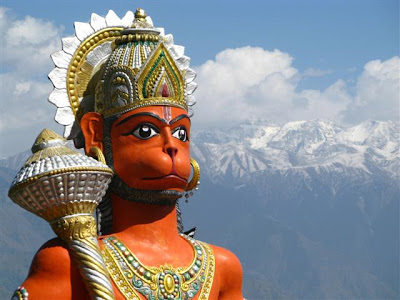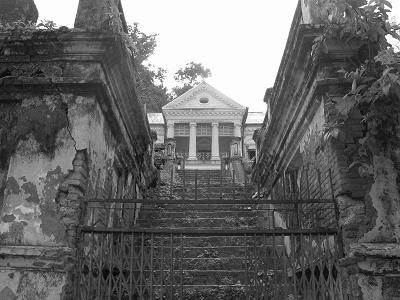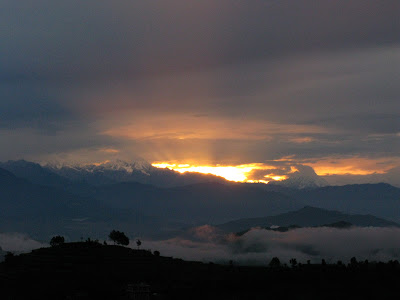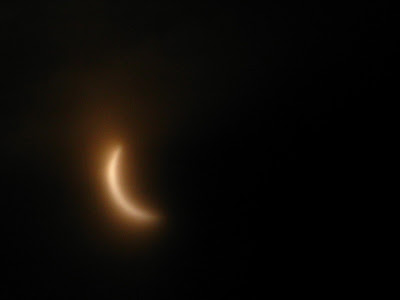I decided to leave Tansen, the little town in the hills that I had come to love. But my time was short, and the distance long. So onward to Delhi I thought I would go, with a stop off in Lumbini for the night. I packed my things, checked out of the Siddharta hotel, and walked down the hill, stopping for one last Roti and potato curry breakfast on the way.
I quickly found a bus heading out of the valley to Butwal, and got on. It was crowded inside, so much so that I was jammed in facing backward on a hump seat at the front. I tucked my pack close to my legs and huddled in as people continued to push into the bus until there was no where to move. The bus caller asked if he could put my bag on the roof, and I hesitatingly accepted.
The bus pulled away, and I asked quickly if I could crawl up on the roof to sit instead, but I was told no, and generally that is the case within city limits in Nepal. About 45 minutes down the valley, a woman to my left started vomiting, really filling up a plastic bag with yellowish barf. She was sweating and looked extremely road sick. Perhaps I looked uncomfortable as at this moment the bus caller invited me to climb out and on the roof. I readily accepted and hauled myself up to the top, joining a couple other guys up there.
I scanned the roof rack for my bag, thinking I would sit on it for comfort. "Hey, where's my backpack?" I shouted down into the bus. A head poked out and told me not to worry, it was in the back of the bus. I was relieved, and sat down, smiling. Wait, I thought. He put it up here. "Hang on, where's my backpack?" I called down again. Talk in Nepali. Glances at me. Pointing. Nervous looks.
I started getting worried; clearly something was wrong, and the reality sunk in that either my bag had been left, fallen off, or was stolen.
I climbed down, facing the bus caller, this time demanding an answer. Go with the bus to Butwal, I was told, and he will go back up and look for my bag. I told him to send the bus on. If my pack is missing, I'm going to find it, and if not, well, I didn't think that far ahead.
We caught another bus, and I spent an hour riding back up hill telling myself that it's just stuff and I shouldn't worry yet anyway because we didn't know what had happened. Before long, he looked at me and said we should get off and check at this road side restaurant. This worried me. Why here? Why not start at the bus park? What did he know?
We asked a lady there and she actually said that she thought a man had walked past down a trail with what could have been my pack. What to do? It's been two hours already.
A motorcycle pulled up, and luckily there was my friend Kiran, a local student I had hung out with and shot pool with the previous night. I explained what had happened and he promised me that we would find my bag. Down the road there was a group of college students and people hanging around, and we approached them. Kiran knew some of them so I explained again the situation and promised a 1000 rupee reward for my bag. Thus our posse was formed.
We were about 12 people and 4 motorbikes. We headed out on the trails, asking people as we went, driving through mud and around hills and rocks. But no one had any further information.
I was despondent, and beginning to give up hope. One of the students said, "never lose hope". But looking out over the valley, I thought that in two hours, someone could be anywhere in those hills. I offered money for gas, but no one took it, too disappointed to take any money. We drove back to the road side restaurant.
A van was there, the door just shutting. Something in my mind flashed and I hurried up the hill, unsure of what I had seen but certain of something. I threw open the door of the van, slamming it, and looked in. My backpack was there, on the floor of this van. I stared at the man. "Where did you get this? Why do you have my bag?" I demanded. By then, the posse had surrounded the van, questioning this man, and the driver.
They had found it up on a hill, they said, by some old house. But why were they here now, at this moment, and what were they planning to do? These questions remained unanswered, but the posse was convinced of their innocence. I was relieved, shocked and also confused, but so happy to have my bag. Trusting my gang, I offered the two men some cash which they accepted. I also, strangely, felt guilty, unsure of the meaning of these events, wondering why I deserved such fortune. Though I happily slung the pack over my shoulder, pleasantly feeling it's weight.
I opened the top and unzipped the compartments to verify my belongings. Everything was there save the nylon sac for my rain coat, strangely, and some of the ties had been knotted together. Basically, it was all there. I suggested, as had been mentioned earlier, reporting the event to the police, but was told they would likely do little if anything.
I handed the posse a 1000 rupee note, and we retired to the restaurant for tea and food. We discussed the events and came to have a good time together. I decided to postpone my trip by one day and stick around, as it was getting late. But at this, the posse didn't disband. We cruised the hills, happy and excited by the strangeness of the day and the new friendships it had arranged.
I had my bag, as if it had never been gone. And we had a story, some new pals, and the once in a lifetime experience of roaming the countryside on two-wheeled steeds as a band of men, a posse, with valiant intentions, and justice in our minds.
What is the meaning of this? Why did this happen? I don't know, but I'm glad that it did.

.jpg)
.jpg)

.jpg)
.jpg)
.jpg)
.jpg)
.jpg)
.jpg)
.jpg)
.jpg)









































